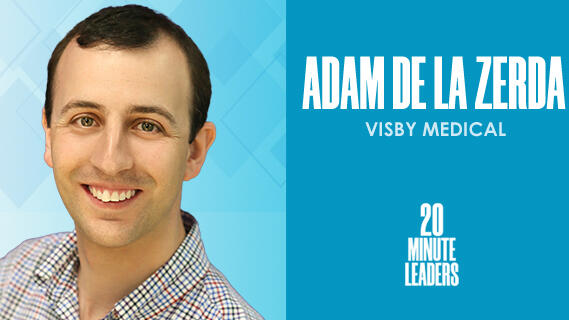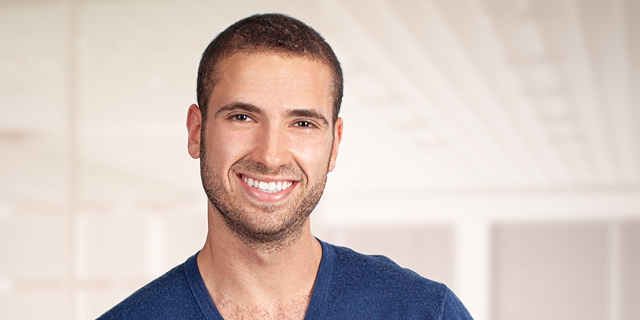
20-Minute Leaders
“Changing consumer behavior is hard. But the pandemic showed that there is a way.”
Those working at Visby Medical have always shared a sense of purpose to help patients, shares founder and CEO Adam de la Zerda
Click Here For More 20MinuteLeaders
Tell me about your background.I grew up in Israel. I'm a physicist, computer scientist, and electric engineer by training. I came to Stanford to do my PhD in electrical engineering. I did not realize that I'd fall in love with the world of medicine or that engineers have something to contribute to medicine. The chairman of the Department of Radiology, Sam Gambhir, basically exposed me to medicine.
In academia, we focus on converting good ideas into papers. It felt to me that we really needed to start a company that can make a physical product that will help people. That's where Visby Medical really came to being. I started a company that really was intended to solve that problem. To see an idea you come up with turning into a physical product that actually helps somebody is incredibly gratifying.
Growing up in Israel as an engineer, did you know that later you're going to be building a company or joining the medical world?
Not at all. I went to Stanford because Stanford has one of the best groups of quantum computers. But then a good friend of mine passed away from brain cancer. That changed what I wanted to do in life. It was very clear that if there's any way I can contribute to the world of medicine, I really should.
What was your thesis that led to this first product for Visby Medical?
The first question we asked is, "Why is it that in the world of infections we treat patients before we know the diagnosis?" It's unique to that area of medicine. You will never see a physician telling a patient, "I'm not sure if you have cancer or not. Let's give you some chemotherapy and see."
But for infections, that's exactly what we're doing. We treat them first, and a few days later, the result comes back from the lab. It is not because of a lack of technology. There is a technology that works really well called PCR. PCR can test any infection. The fundamental challenge is really patient accessibility.
Just take sexually transmitted infections, like chlamydia, gonorrhea, and trichomoniasis. In the United States, there are almost 50 million tests like this every year. All of them are run in the centralized lab. About 50% of the time, the result from the lab doesn't make it back to the patient
With positive results, the doctor tries to call the patient, but the patient's not picking up or did not give the right phone number. Because of that, we have patients that are now suffering the long-term consequences of these STDs. We said, "We have to solve that." It’s not about coming up with new technology; it's about solving a patient access problem.
What happened as COVID was breaking out?
In March of 2020, we had just submitted the package to the FDA for our sexually transmitted infection tests. It was very clear for us that the fundamental technology we created can also be relevant for COVID. We had an all-hands meeting. We said, "We're seriously thinking about joining the fight against COVID. We think it's the right thing to do. We think there's also potential benefits for the company." That was a pretty hard discussion because we had to tell our employees that we're going to start growing really fast in an uncomfortable way. Imagine a hundred-person company starting to recruit about 20 people a week. We've probably squeezed three, four years worth of growth into a 12 month period. That was painful.
But it was also very gratifying to see actual patients using our COVID test. In less than six months, we've gone from deciding to do a COVID test to adapting our technology to build the first single-use rapid PCR test ever created for COVID, to getting through clinical trials and submitting to the FDA. By the fourth quarter of last year, we launched that really important product.
What was that experience like for you, onboarding 20 people a week to the company you built?
It was definitely a challenging time. We also had our third baby in March 2020. So managing that and really making sure that the fundamentals of the company that we really love and cherish, our culture, our values, can still flourish. Imagine if you left for a month on a family leave and the company just doubled in size. That's really dangerous if you're not being really intentional. We've made some mistakes along the way, but time was of the essence.
Was there a sense of mission or urgency? What was the sense in the office like?
The sense of urgency and purpose was amazing. Not to say that before the pandemic, it wasn't there. There's another reason why people are here beyond just financial gains. It's really because they feel like they can make a meaningful impact on patients’ lives. But when the pandemic hit, that sense of purpose just increased so much because it got so close to home.
Everyone in the ecosystem around this company was helpful. The federal government stepped in in a massive way. Not just financially, but helping us get better chances with suppliers. It took the work of so many people, both within the company and outside. Every single one of them worked with an extreme sense of purpose. It was very heartening.
A few years down the line when I can purchase these different devices and take ownership of the diagnostics, is there going to be consumer behavior that needs to be shifted or any education for the market that’s needed?
I think it's important for us to leverage, as much as possible, these existing ecosystems that work well. Fundamentally, changing consumer behavior is hard. But the pandemic showed that there is a way. Telemedicine existed before the pandemic. But when the pandemic started, it increased by 50-fold. Last mile delivery systems also really stepped up. Think about these two ecosystems and what you can now enable for users if you just add to that a Visby device.
Imagine that journey where you can allow somebody from their own home to go into their telemedicine app and say, "These are the symptoms I'm feeling." That now generates the prescription so your insurance will hopefully pay for that. A DoorDash then comes to give you this device, you run the test, and within minutes, you know what you have. Then an hour later, a prescription comes to your door. You can allow people to go from having symptoms to a definitive diagnosis to a pill going into their mouth in a couple of hours and they never have to leave home.
Some of the most interesting technologies are being developed in academia. What needs to happen to mitigate some of the dissonance that papers are great but we also have these deep technology advancements coming into play in our daily lives?
Many universities have already figured out how to enable really deep, meaningful partnerships between academia and industry. I think Stanford is really a wonderful example.
In the medical school, so many times we're partnering with industry but always maintaining a very high level of academic freedom. That's really critical. I think, generally, industry should be incredibly grateful for the fact that we have such leading academic centers that can really partner with them. We never want to disrupt academic freedom. But we certainly want to expose it more and more to industry so that we can make more meaningful ties.
Michael Matias, Forbes 30 Under 30, is the author of Age is Only an Int: Lessons I Learned as a Young Entrepreneur. He studies Artificial Intelligence at Stanford University, is a Venture Partner at J-Ventures and was an engineer at Hippo Insurance. Matias previously served as an officer in the 8200 unit. 20MinuteLeaders is a tech entrepreneurship interview series featuring one-on-one interviews with fascinating founders, innovators and thought leaders sharing their journeys and experiences.
Contributing editors: Michael Matias, Megan Ryan

